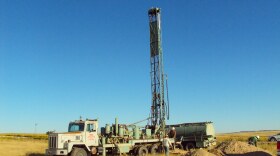-
Uranium got a boost in federal recognition this fall, and a company planning to develop in Wyoming hopes that means federal dollars will follow.
-
The Radiation Exposure Compensation Act expired on Friday, June 7, leaving many people who were affected by nuclear testing and research in the West without a way to get monetary support for their suffering. Supports of the act are still fighting for expansion of the act and trying to find other ways to revive the program.
-
The Radiation Exposure Compensation Act is set to expire unless Congress acts to reauthorize it. If no action is made, the federal government won't accept claims postmarked after June 10, 2024.
-
The Radiation Exposure Compensation Act was established in 1990 and has helped more than 40,000 people who developed medical problems after being exposed to radiation through government nuclear tests, uranium mining, and other toxic fallout. Existing protections are set to expire on June 7 unless Congress intervenes.
-
A recent U.S. House hearing that centered on a relatively unknown segment of federal energy policy quickly evolved into a discussion on how much the government should prioritize mining.
-
U.S. support for nuclear power is the highest it's been in a decade. And there are a number of proposals for new plants in our region. That could mean an uptick in domestic uranium mining.
-
Some officials in the Mountain West want to ramp up American uranium production to power future nuclear reactors. But expanding operations in the region is concerning for many local residents, particularly tribal communities.
-
Wyoming would like to have more control over regulating the rare earth mineral industry – the hope being it would spur nuclear development in the state.A bill that recently passed its committee would create a ‘source material associated with the mining agreement.’ Source materials are radioactive byproducts that can come from rare earth mineral mining, including the mineral uranium.
-
The opening date is being delayed for the nuclear plant that is slated to replace the Naughton coal plant near Kemmerer.The start date will likely be pushed back two years to 2030, according to a press release from the nuclear plant developer TerraPower. The main reason is Russia’s war in Ukraine, as Russia is the only commercial supplier of the highly enriched uranium (HALEU) the plant needs to run.
-
Russia's invasion of Ukraine has led to calls to reduce or eliminate its energy exports by many countries. This has given industry experts hope that it will revive the U.S.'s fledgling uranium industry, which has suffered from cheap exports largely from Russia and Central Asia. Wyoming may be one of the major beneficiaries of a revived uranium industry, which it hosted during many of the Cold War years.
© 2026 Wyoming Public Media
800-729-5897 | 307-766-4240
Wyoming Public Media is a service of the University of Wyoming
800-729-5897 | 307-766-4240
Wyoming Public Media is a service of the University of Wyoming

Play Live Radio
Next Up:
0:00
0:00
Available On Air Stations












